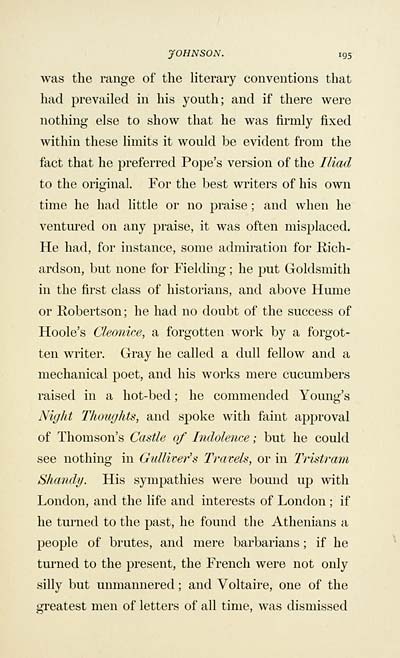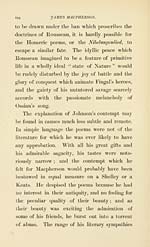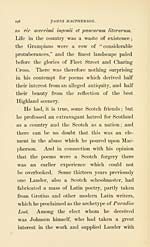Download files
Complete book:
Individual page:
Thumbnail gallery: Grid view | List view

yOHNSON. 195
was the range of the literary conventions that
had prevailed in his youth; and if there were
nothing else to show that he was firmly fixed
within these limits it would be evident from the
fact that he preferred Pope's version of the Iliad
to the original. For the best writers of his own
time he had little or no jDraise ; and when he
ventured on any praise, it was often misplaced.
He had, for instance, some admiration for Rich-
ardson, but none for Fielding ; he put Goldsmith
in the first class of historians, and above Hume
or Robertson; he had no doubt of the success of
Hoole's Cleonice, a forgotten work by a forgot-
ten writer. Gray he called a dull fellow and a
mechanical poet, and his works mere cucumbers
raised in a hot-bed ; he commended Young's
Night Thoughts, and spoke with faint approval
of Thomson's Castle of Indolence ; but he could
see nothing in Gidliver's Travels, or in Tristram
Shandy. His sympathies were bound up with
London, and the life and interests of London ; if
he turned to the past, he found the Athenians a
people of brutes, and mere barbarians ; if he
turned to the present, the French were not only
silly but unmannered ; and Voltaire, one of the
greatest men of letters of all time, was dismissed
was the range of the literary conventions that
had prevailed in his youth; and if there were
nothing else to show that he was firmly fixed
within these limits it would be evident from the
fact that he preferred Pope's version of the Iliad
to the original. For the best writers of his own
time he had little or no jDraise ; and when he
ventured on any praise, it was often misplaced.
He had, for instance, some admiration for Rich-
ardson, but none for Fielding ; he put Goldsmith
in the first class of historians, and above Hume
or Robertson; he had no doubt of the success of
Hoole's Cleonice, a forgotten work by a forgot-
ten writer. Gray he called a dull fellow and a
mechanical poet, and his works mere cucumbers
raised in a hot-bed ; he commended Young's
Night Thoughts, and spoke with faint approval
of Thomson's Castle of Indolence ; but he could
see nothing in Gidliver's Travels, or in Tristram
Shandy. His sympathies were bound up with
London, and the life and interests of London ; if
he turned to the past, he found the Athenians a
people of brutes, and mere barbarians ; if he
turned to the present, the French were not only
silly but unmannered ; and Voltaire, one of the
greatest men of letters of all time, was dismissed
Set display mode to: Large image | Transcription
Images and transcriptions on this page, including medium image downloads, may be used under the Creative Commons Attribution 4.0 International Licence unless otherwise stated. ![]()
| Early Gaelic Book Collections > Ossian Collection > Life and letters of James Macpherson > (213) |
|---|
| Permanent URL | https://digital.nls.uk/80361291 |
|---|
| Description | Selected books from the Ossian Collection of 327 volumes, originally assembled by J. Norman Methven of Perth. Different editions and translations of James MacPherson's epic poem 'Ossian', some with a map of the 'Kingdom of Connor'. Also secondary material relating to Ossianic poetry and the Ossian controversy. |
|---|
| Description | Selected items from five 'Special and Named Printed Collections'. Includes books in Gaelic and other Celtic languages, works about the Gaels, their languages, literature, culture and history. |
|---|

